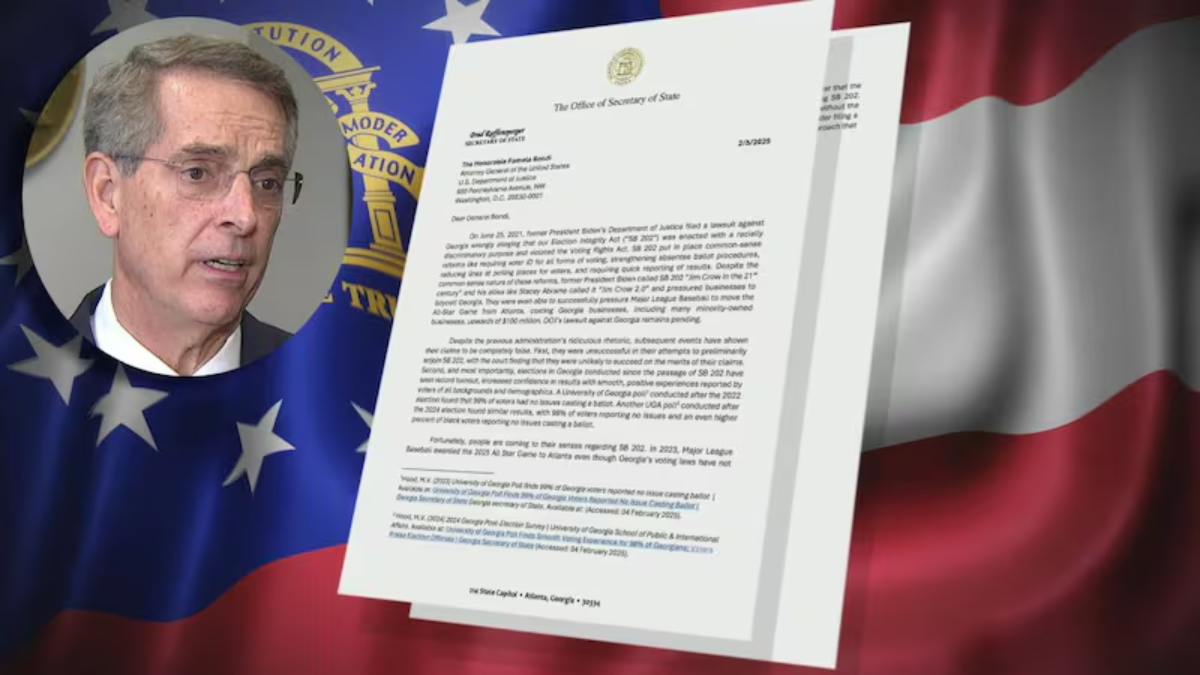Georgia Secretary of State Brad Raffensperger has formally urged the US Justice Department to drop its lawsuit challenging Georgia’s election laws. The lawsuit, originally filed in response to Senate Bill 202, has become a focal point in the national debate over voting rights and election security. Raffensperger argues that the legal challenge is unnecessary and that Georgia’s election processes are fair, secure, and transparent. Meanwhile, opponents claim the law imposes undue restrictions on voter access, particularly for minority communities.
Background on the Lawsuit
The Justice Department filed a lawsuit against Georgia in response to the state’s passage of Senate Bill 202, an election reform measure signed into law in 2021. The law introduced several changes to Georgia’s voting procedures, including:
- New voter ID requirements for absentee ballots
- Restrictions on ballot drop boxes
- Limitations on distributing food and water to voters waiting in line
- Shortened absentee ballot request deadlines
Federal officials argue that these provisions disproportionately affect minority voters and restrict access to the ballot box. The lawsuit contends that the law violates the Voting Rights Act by creating barriers that could suppress voter participation.
Raffensperger’s Request
Secretary of State Brad Raffensperger is pushing back against the lawsuit, asserting that Georgia’s election law aligns with federal guidelines and ensures the integrity of the voting process. He argues that Georgia’s elections have remained accessible and secure, even with the changes implemented by SB 202. His key points include:
- Election security improvements: Raffensperger maintains that requiring voter ID for absentee ballots strengthens election integrity without suppressing votes.
- State sovereignty: He believes that the Justice Department is overstepping its authority and interfering in Georgia’s right to manage its elections.
- Voter access remains intact: According to Raffensperger, voter turnout in Georgia has remained strong despite the new regulations, demonstrating that the law does not inhibit participation.
Raffensperger has repeatedly criticized the Biden administration for targeting Georgia while other states with similar voting laws have not faced legal challenges from the federal government.
Reactions and Political Implications
The request to drop the lawsuit has sparked a polarized response:
- Supporters of SB 202 argue that the lawsuit is politically motivated and unnecessary. They point to Georgia’s record voter turnout in recent elections as proof that the law does not suppress votes.
- Opponents of SB 202 believe the law creates unnecessary barriers, particularly for minority communities. Civil rights groups and Democratic leaders continue to push for the lawsuit to proceed, arguing that it is essential to protect voting rights.
Legal experts note that the outcome of this lawsuit could have national implications, potentially setting a precedent for how states can regulate their elections without federal intervention.
What Happens Next?
The Justice Department has yet to indicate whether it will drop the lawsuit following Raffensperger’s request. Legal analysts suggest that the case could continue for months, possibly even reaching the Supreme Court. If the lawsuit proceeds, it will likely become a major talking point leading into the 2024 elections, influencing discussions about voting rights and election integrity nationwide.
For ongoing updates on this legal dispute, visit the US Department of Justice website.
Disclaimer – Our team has carefully fact-checked this article to make sure it’s accurate and free from any misinformation. We’re dedicated to keeping our content honest and reliable for our readers.








